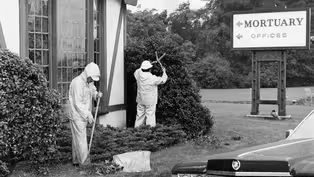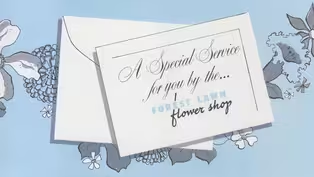
How the Film Industry Transformed Hollywood Forever Cemetery
Preview: Season 6 Episode 4 | 3m 3sVideo has Closed Captions
How Hollywood Forever became the cemetery where countless celebrities were laid to rest.
Lost LA host Nathan Masters and UCLA's Eric Avila get a tour from historian Karie Bible to learn how the film industry's arrival to Los Angeles in the 1920s transformed Hollywood Forever — the cemetery where countless movie stars, rock idols and industry titans are now laid to rest. Discover how its history is intertwined with that of Paramount Pictures, as well as other movie studios.
Problems playing video? | Closed Captioning Feedback
Problems playing video? | Closed Captioning Feedback
Lost LA is a local public television program presented by PBS SoCal

How the Film Industry Transformed Hollywood Forever Cemetery
Preview: Season 6 Episode 4 | 3m 3sVideo has Closed Captions
Lost LA host Nathan Masters and UCLA's Eric Avila get a tour from historian Karie Bible to learn how the film industry's arrival to Los Angeles in the 1920s transformed Hollywood Forever — the cemetery where countless movie stars, rock idols and industry titans are now laid to rest. Discover how its history is intertwined with that of Paramount Pictures, as well as other movie studios.
Problems playing video? | Closed Captioning Feedback
How to Watch Lost LA
Lost LA is available to stream on pbs.org and the free PBS App, available on iPhone, Apple TV, Android TV, Android smartphones, Amazon Fire TV, Amazon Fire Tablet, Roku, Samsung Smart TV, and Vizio.
Providing Support for PBS.org
Learn Moreabout PBS online sponsorshipAlthough it began as the local burial ground for the buttoned-up town of Hollywood, founded by Kansans Harvey and Daeida Wilcox, it was soon taken over by the burgeoning film industry.
Today, few cemeteries can boast more movie stars, rock idols, and film industry titans.
Masters: Right here at Hollywood Forever, you have probably the entire history of the surrounding community-- Hollywood as a geographic district documented.
Avila: Absolutely.
The cemetery started before Hollywood was Hollywood, when it was a dry town founded by migrant Midwesterners.
And then the film industries came in roughly the 1920s.
Masters: Yeah.
Avila: And for about 50 years, this cemetery served the film industry.
Masters: Well, when the film industry arrived, I mean, that was a complete 180 in terms of values, right?
Because the movie industry had this-- Avila: Right.
Masters: these libertine associations.
Avila: Right.
Masters: Not exactly what Harvey Wilcox was going for.
Avila: Not at all.
No, it went from this kind of upright, upstanding Midwestern culture--dry-- to Hollywood-- Masters: Right!
Avila: boozy crowd that was partying and everything.
But then fast-forward to the seventies, when the film industry begins to leave and this whole area falls into decline, and this cemetery absolutely reflected that decline as well, until it was kind of revived in the 1990s as new immigrant groups came into the area.
And their presence is a part of the cemetery as well.
Masters: And you can see that reflected in, you know, the names on the markers or even just the style of markers, the style of monuments.
Avila: Absolutely.
Different ethnic groups, immigrant groups, religious groups.
It all kind of comes together on this site.
Masters: So, we should talk about Paramount, because the histories of this cemetery here and the Paramount lot are intertwined.
Avila: Right.
Paramount sits on land that used to be part of the cemetery.
Hollywood Forever sold its land to Paramount Studios.
Masters: That must make this place unique among cemeteries.
Avila: Yeah.
Masters: And there is a lot of Hollywood film history to see here.
Woman: I am the tour guide at Hollywood Forever Cemetery.
I've been doing this a little over 21 years.
Masters: And the main reason people take tours is to see famous people.
Woman: Well, they want to see famous people, but also, this cemetery is such an absolutely gorgeous place.
And for a place that is, of course, about death, it's also about life, about celebrating those lives.
And this is a really unique, innovative place.
We have outdoor movie screenings, indoor/outdoor concerts, yoga classes.
I think the cemetery is also a very creative space.
And you'll see by a lot of the monuments, it's not cookie-cutter.
It allows people to express themselves and their creativity, and I think that's a major draw for many people.
Masters: All right, who are some of the most famous people buried here?
Woman: Well, it kind of depends on what era you love, but we have Johnny Ramone, Rudolph Valentino, Marion Davies, Douglas Fairbanks, Burt Reynolds, Chris Cornell, Mickey Rooney, Judy Garland.
We have an all-star lineup of incredible people here.
Eternal City: Los Angeles Cemeteries (Preview)
Video has Closed Captions
Preview: S6 Ep4 | 30s | Visit Hollywood Forever, Evergreen and Forest Lawn, where L.A. reinvented the cemetery. (30s)
Forest Lawn Cemetery: A Romantic Wedding Destination?
Video has Closed Captions
Clip: S6 Ep4 | 2m 20s | Learn why so many couples have had the weddings of their dreams at Forest Lawn cemetery. (2m 20s)
Providing Support for PBS.org
Learn Moreabout PBS online sponsorshipSupport for PBS provided by:
Lost LA is a local public television program presented by PBS SoCal

















